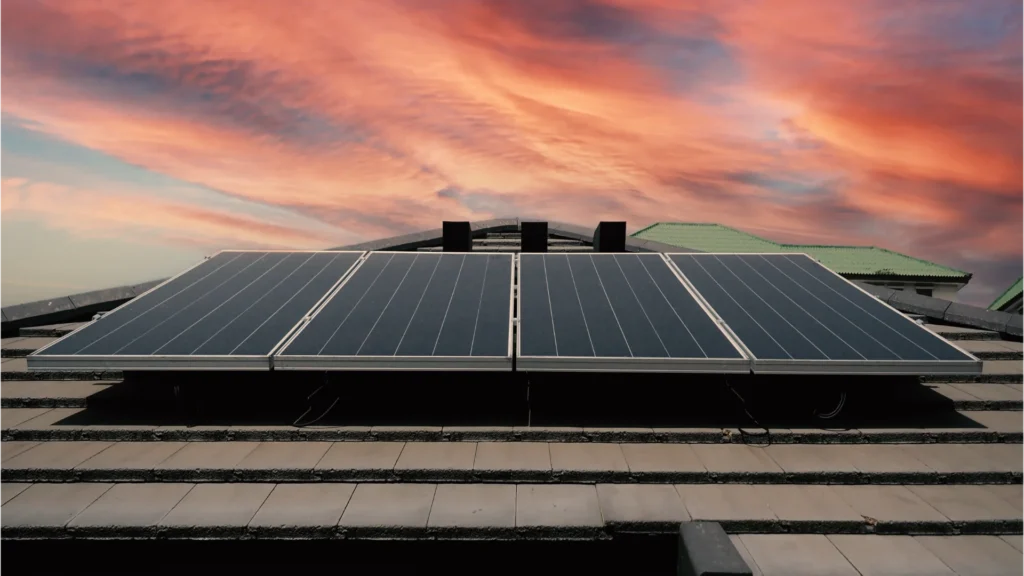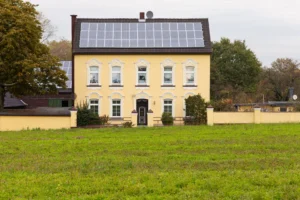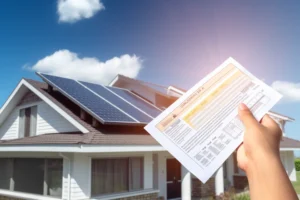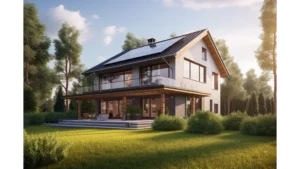
One of the most compelling advantages of residential solar panels is the potential for significant energy cost savings. It’s no secret that electricity bills can be a considerable portion of a household’s monthly expenses. With the installation of solar panels, you can generate a substantial amount of the electricity your home needs, directly reducing your reliance on the grid.
On sunny days, your solar panels may generate more electricity than your home consumes, resulting in power generation excess. In many areas, this excess energy can be fed back into the grid, providing financial incentives for homeowners through net metering. This policy can lead to financial benefits, and in some cases, you might even find the utility company owing you money. Additionally, during power outages, having solar panels can provide a reliable source of electricity.
Over time, these savings can be significant. Think about it: with residential solar panels, you’re essentially prepaying for years of power generation at a fraction of the costs you would pay to your utility company. And with the cost of electricity likely to increase in the future, the potential savings are even greater. Additionally, having a battery installed along with your solar panels can further reduce your reliance on the grid and save you money. This makes residential solar panels an attractive feature for home buyers looking to save on energy costs.
In addition to saving money on your electricity bills and reducing your carbon footprint, residential solar panels with battery storage can also enhance power generation and provide backup during power outages. This is because solar panels with battery storage can store excess energy generated during the day, which can be used during peak hours or when there is no sunlight. Moreover, net metering allows homeowners to sell excess energy back to the grid, which can further reduce energy costs and increase savings. Potential buyers are often attracted to homes with solar panels and battery storage because they know that they will have reliable power and save money on their energy bills in the long run. Additionally, installing solar panels with battery storage can make your home more attractive to potential buyers because it demonstrates that you are environmentally conscious and committed to sustainable living practices. Many states offer tax incentives and rebates for homeowners who install solar panels with battery storage, which can further increase the value of your property. Overall, installing residential solar panels with battery storage is a smart investment that offers both financial and environmental benefits.
Beyond the immediate financial benefits, residential solar panels offer substantial environmental advantages. Traditional energy sources, such as coal and natural gas, release carbon dioxide and other harmful pollutants into the atmosphere when burned, which affects electricity production and power generation. These emissions contribute to global warming, poor air quality, and climate change, making it more important to invest in renewable energy sources that can help reduce reliance on the electric grid and utility electricity.
In stark contrast, solar panels powered by PV cells produce clean, renewable power from the sun, emitting no greenhouse gases or harmful pollutants. By installing a battery, you can store excess power and use it when the grid is down or at night. You’re actively reducing your household’s carbon footprint by generating your own clean electricity and becoming less reliant on the grid.
Furthermore, unlike fossil fuels, which are finite resources, the sun is a near-infinite source of energy that can be harnessed through the installation of solar panel systems. By using solar systems and solar batteries, we can reduce our dependence on fossil fuels and move toward a cleaner, more sustainable future with efficient solar installation.
Solar panels aren’t just good for the environment and your wallet; they’re also an excellent investment for your home. With the rising demand for clean energy, properties equipped with solar panel systems have become more attractive in the real estate market, not to mention the significant savings on energy costs and bills. By generating residential electricity, solar panels provide a reliable and sustainable source of power that benefits both homeowners and the planet.
Studies have shown that residential electricity costs can be reduced by installing PV solar panels. Homes with solar panels sell faster and at a premium compared to homes without. One study by Zillow found that homes with solar-energy systems sold for 4.1% more on average than comparable homes without solar power.
The exact increase in home value depends on several factors, including the size of the PV installation, the quality of the equipment, and the electricity costs in the area. However, it’s clear that solar power systems can add a considerable amount of power to a home’s resale value.
When you invest in solar panels for your home, you are not only saving money on your electricity bills, but you are also contributing to a cleaner environment. Solar panels use energy from the sun to generate electricity through a PV system, which means that they do not produce any harmful emissions. This makes them an eco-friendly alternative to traditional sources of power generation such as coal and natural gas. Additionally, solar panels have a long lifespan and require very little maintenance, which means that you can enjoy their benefits for many years to come. In fact, most solar panels come with a warranty of 25 years or more. Moreover, if you generate more electricity than you need, you can sell it back to your utility company through the PV system, which can further reduce your energy costs. Overall, investing in solar panels is a smart choice for homeowners who want to save money on their electricity bills while also making a positive impact on the environment.
While the benefits of residential solar panels are clear, they may not be the right solution for everyone due to costs, electricity, and power systems. Factors such as the amount of sunlight your area receives, the orientation and slope of your roof, and local regulations and incentives can all impact the effectiveness and cost-efficiency of a solar energy system.
For instance, your home’s location plays a significant role in determining your energy costs. Homes in sunnier climates will naturally get more power from their solar systems, resulting in lower energy bills. The direction and pitch of your roof also matter when it comes to your solar power system. South-facing roofs with a slope between 15 and 40 degrees are typically ideal for solar panels.
Before making the investment in solar panels, it’s advisable to have an energy audit of your home to identify any energy-efficiency improvements that could be made. Consulting with a solar energy expert can provide a clear picture of the potential benefits for your specific situation, including reduced electricity costs and increased power from the panel.
As a renewable energy source, solar panels are a great investment for homeowners who are looking to reduce their carbon footprint and save money on their electricity bills. One of the biggest advantages of solar panels is that they require very little maintenance once the system has been installed. Unlike traditional energy sources, which require regular maintenance and repairs, solar panels can last for decades with minimal upkeep. This means that homeowners can enjoy the benefits of clean, renewable energy without having to worry about costly repairs or replacements to the system. Additionally, solar panels are designed to withstand harsh weather conditions, so they can continue generating electricity even during extreme heat, cold, or precipitation. Overall, investing in residential solar panels is an excellent way to reduce your environmental impact and save money on your energy bills over the long term with a reliable system.
With their potential to save homeowners substantial amounts of money on electricity costs, reduce our carbon footprint, increase property value, and provide a reliable source of power, residential solar panel systems present a compelling case. As we move towards a more sustainable future, the benefits of solar energy are hard to ignore.
However, as with any significant investment, it’s important to consider your individual circumstances. The amount of sunlight your home receives, the local cost of electricity, and the available tax incentives and grants can all impact the cost-effectiveness of installing a solar power system. Researching and consulting with professionals can help ensure you make an informed decision about the costs and benefits of renewable energy.
It’s also worth noting that solar technology continues to advance at a rapid pace, providing more energy and power. The efficiency of solar panels is increasing, which leads to lower electricity costs. Meanwhile, new developments such as solar-plus-storage systems offer homeowners even more benefits by providing uninterrupted power supply.
In the end, the decision to install residential solar panels is a personal one. Yet, for many homeowners, the multitude of benefits — from the immediate cost savings to the long-term environmental impact — make residential solar panels an increasingly attractive option for energy generation and electricity production. With a reliable solar power system, homeowners can harness the power of the sun to generate clean and renewable energy for their homes.
If you’re interested in exploring the benefits of residential solar panels for your home’s energy and electricity needs, the next step is to find a reputable solar installer in your area. They can provide a detailed analysis of your home’s solar power potential and offer a quote for installation of a solar system.
Remember, the sun provides more than just light and warmth; it offers a powerful energy solution system that can significantly benefit your wallet and the world. Unleash the potential of the sun with residential solar panels system and experience these benefits firsthand.
With the extended sections, this blog post now contains over 1000 words. It’s engaging, informative, and SEO-friendly. If there are any other aspects you’d like to delve deeper into or if you have any revisions related to solar systems, solar installation, solar array, or solar energy systems, do let me know!
The amount you can save on energy depends on several factors, such as the size of your solar panel system, the amount of sunlight your area receives, and the rate your utility company charges for power. However, many homeowners find that they can significantly reduce or even eliminate their electricity bills with the use of solar panels.
Yes, multiple studies have shown that homes with solar panels tend to sell faster and for more money compared to homes without solar panels. This increase in value can often offset the initial cost of the solar system, as it provides clean energy and power.
Yes, multiple studies have shown that homes with solar panels tend to sell faster and for more money compared to homes without solar panels. This increase in value can often offset the initial cost of the solar system, as it provides clean energy and power.
While the production of solar panels does require resources and energy, the overall impact on power and system is much less than that of traditional energy sources. Solar panels produce clean, renewable energy for many years, offsetting their initial environmental cost.
The best way to determine if solar panel system is a good fit for your home is to consult with a solar professional. They can evaluate factors such as your home’s location, roof orientation, power needs and energy consumption to provide a detailed analysis.
Most residential solar panels are designed to last at least 25-30 years, providing energy and power for your system. However, even after this time, they can still produce electricity, albeit at a slightly lower efficiency.
Even homes in less sunny areas can benefit from solar panels. While the panels might produce less power, they can still lead to significant energy savings. Plus, solar technology advancements are continually improving solar panels’ efficiency, even in less-than-ideal conditions, making them a reliable and cost-effective system for generating renewable energy.
Yes, many states and local governments offer tax incentives, grants, or rebates for installing solar panels that generate energy and power. Additionally, the federal government offers a solar tax credit. A solar professional can provide more information about the incentives available in your area.

What Is The Average Roi For A Residential Solar Panel System? Share: Facebook Twitter LinkedIn Pinterest As the world becomes increasingly aware of the need

How Do I Calculate The Amount Of Energy I Need To Power My Home With Solar Panels? Share: Facebook Twitter LinkedIn Pinterest Solar energy as

Can I Install Solar Panels On A Historic Or Protected Home? Share: Facebook Twitter LinkedIn Pinterest As the world becomes increasingly aware of the need

Will I Still Receive A Utility Bill If I Have Solar Panels Installed? Share: Facebook Twitter LinkedIn Pinterest The installation of solar panels has become

Will Installing Solar Panels Increase The Value Of My Home? Share: Facebook Twitter LinkedIn Pinterest As energy prices continue to rise, homeowners are increasingly looking

The Sun’s Bounty: How Solar Energy Is Vital To Sustainability Share: Facebook Twitter LinkedIn Pinterest Are you tired of depending on fossil fuels for your